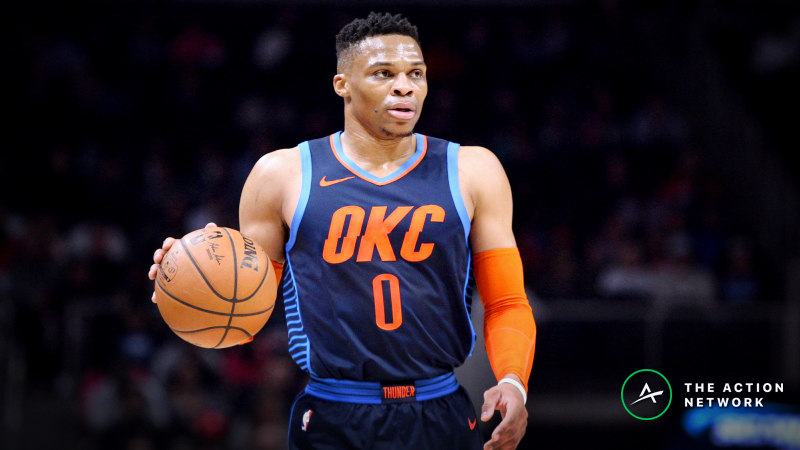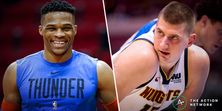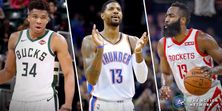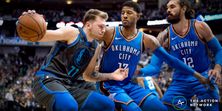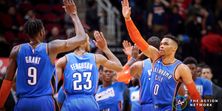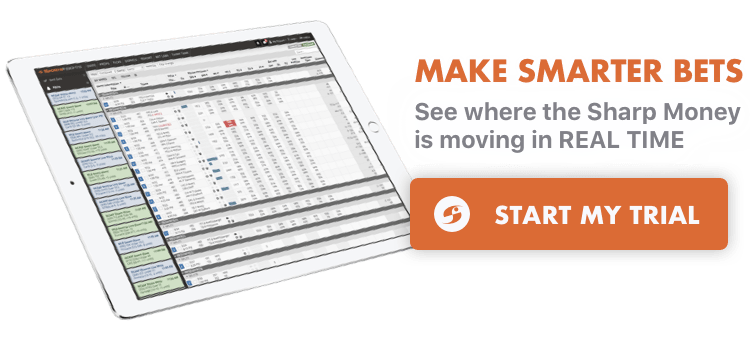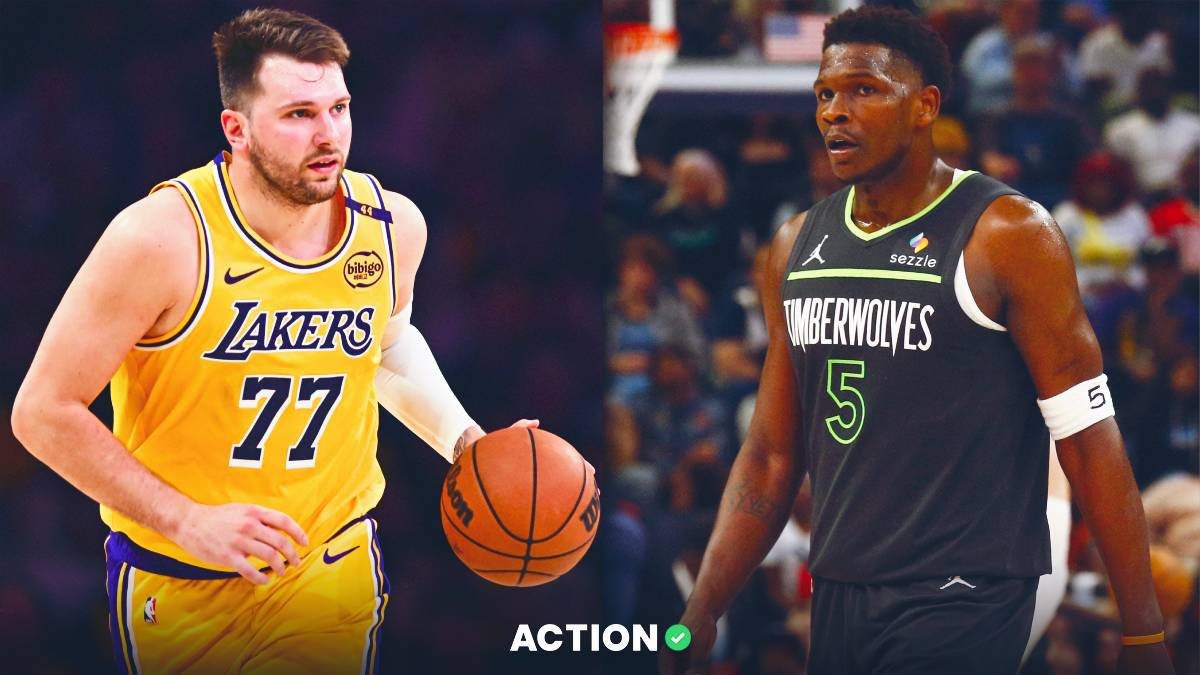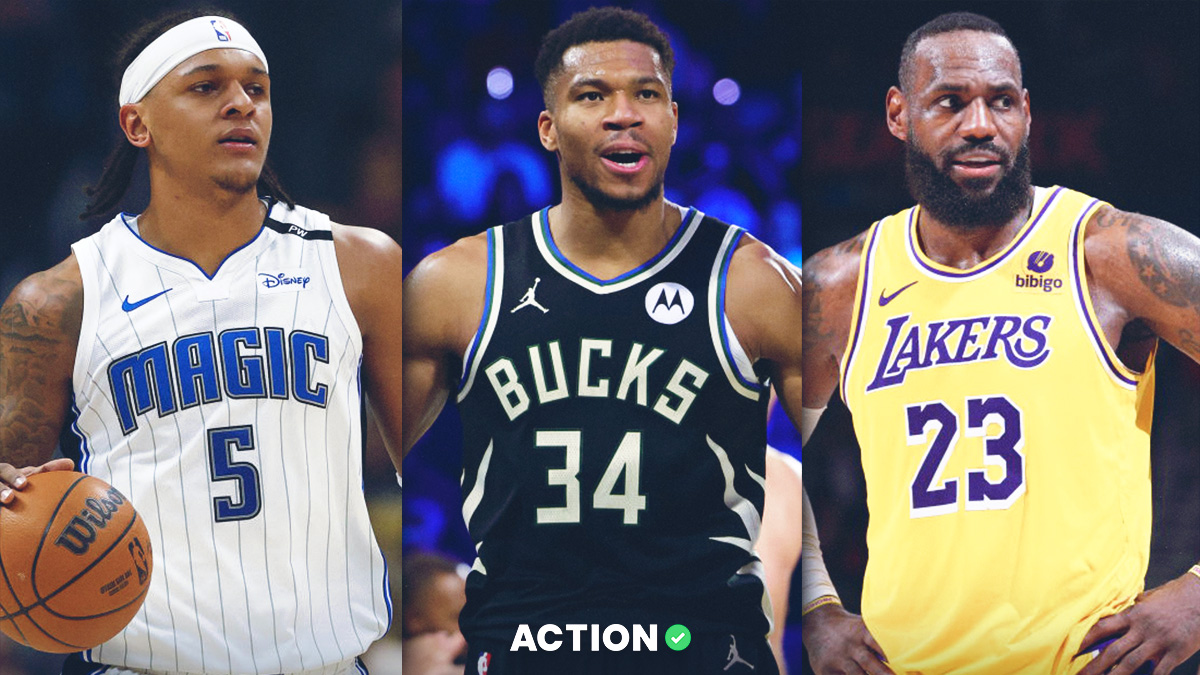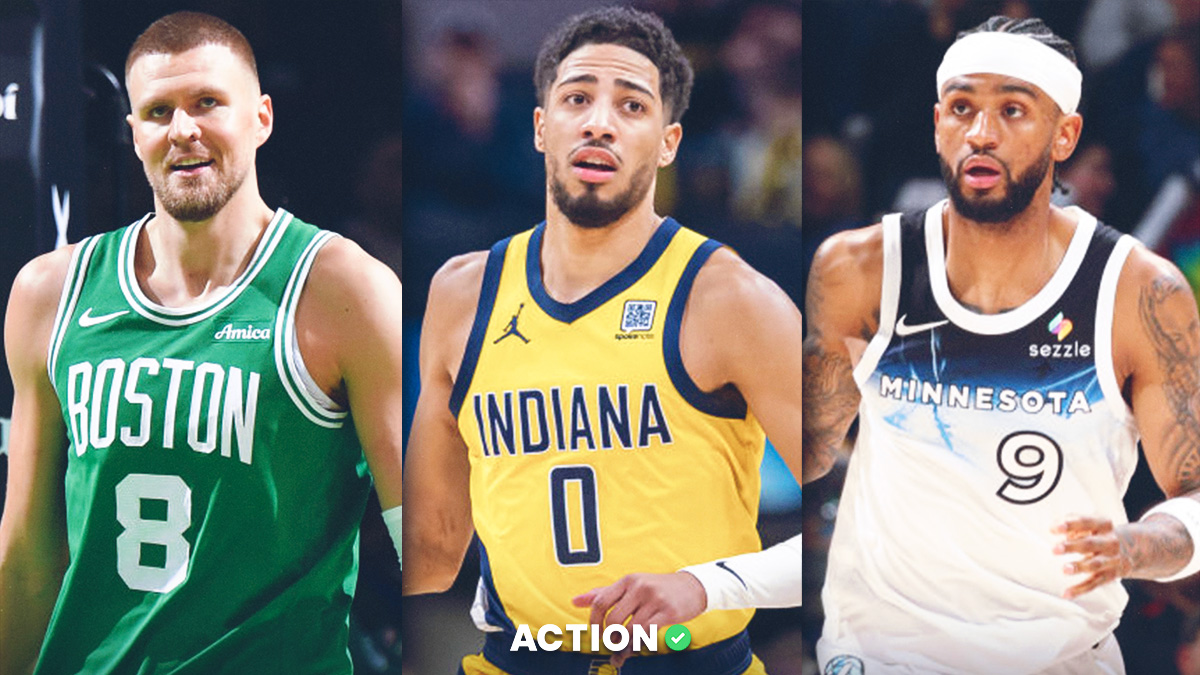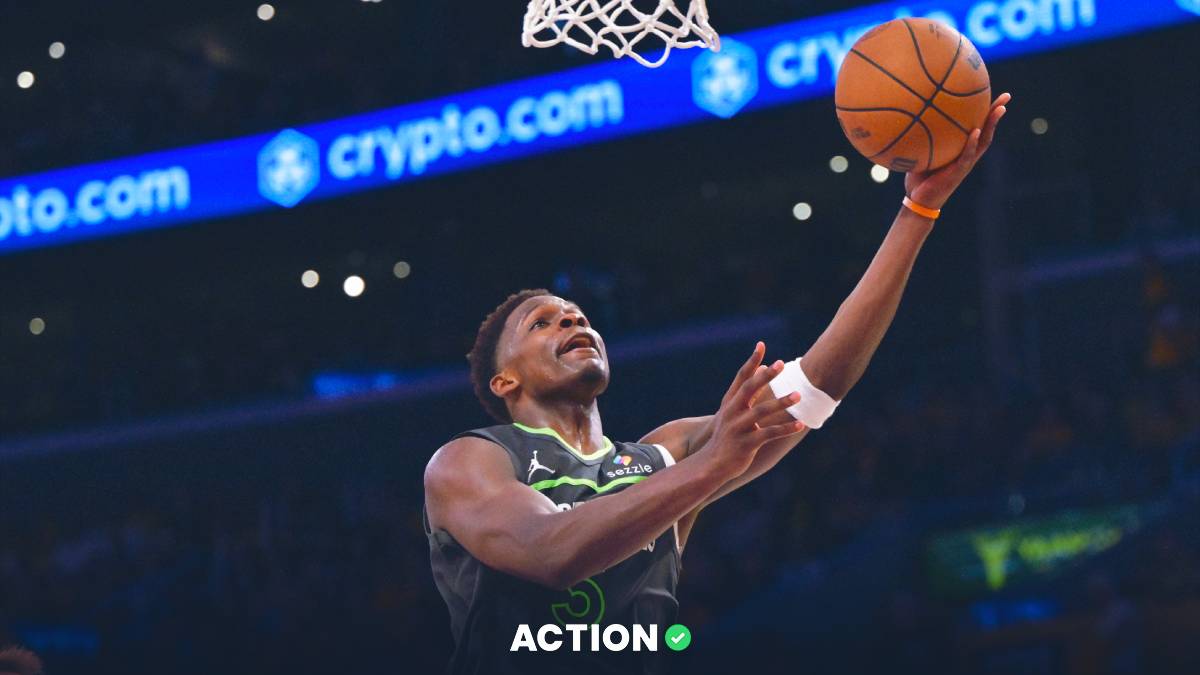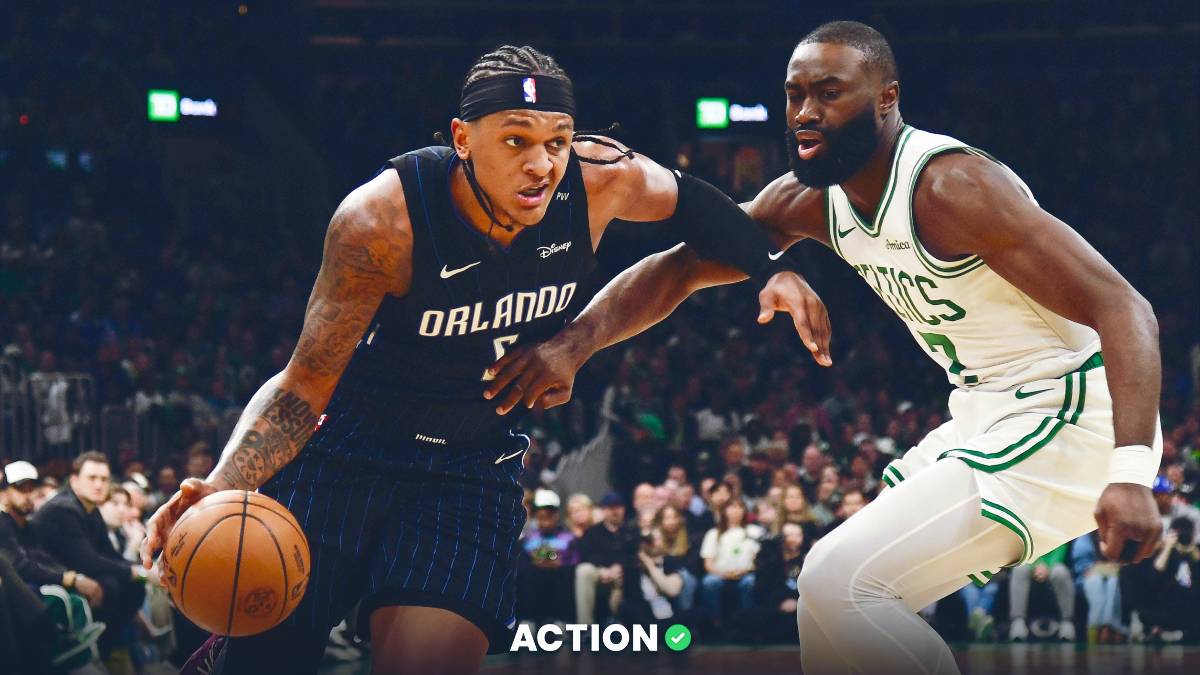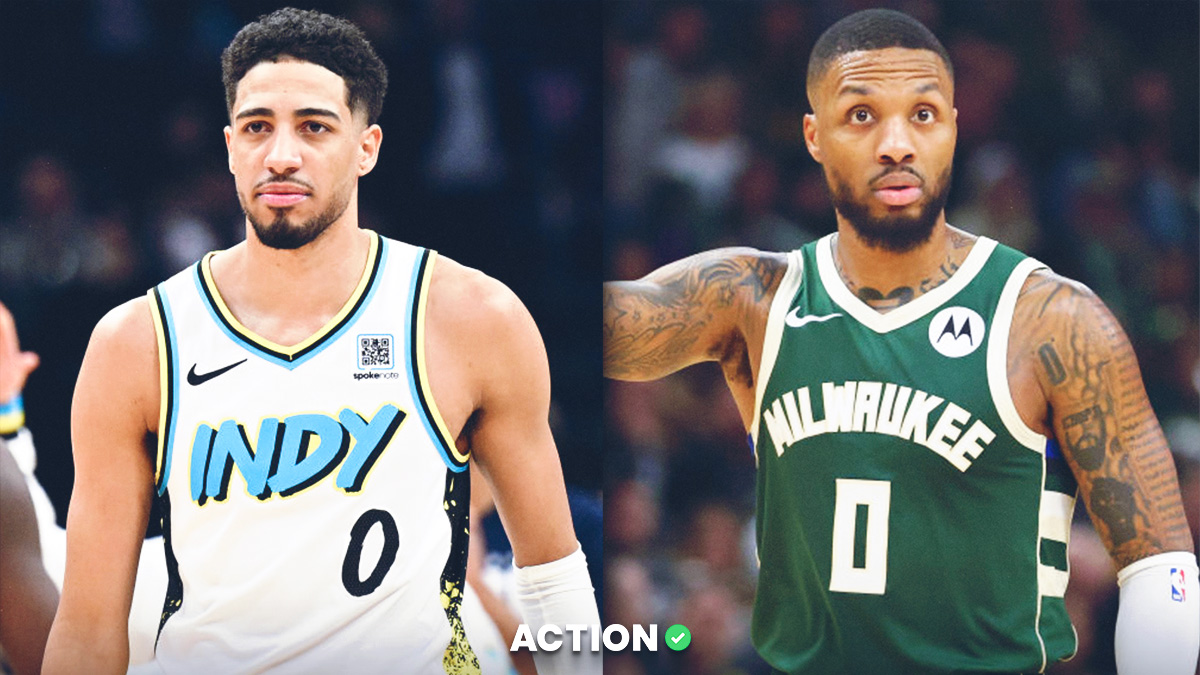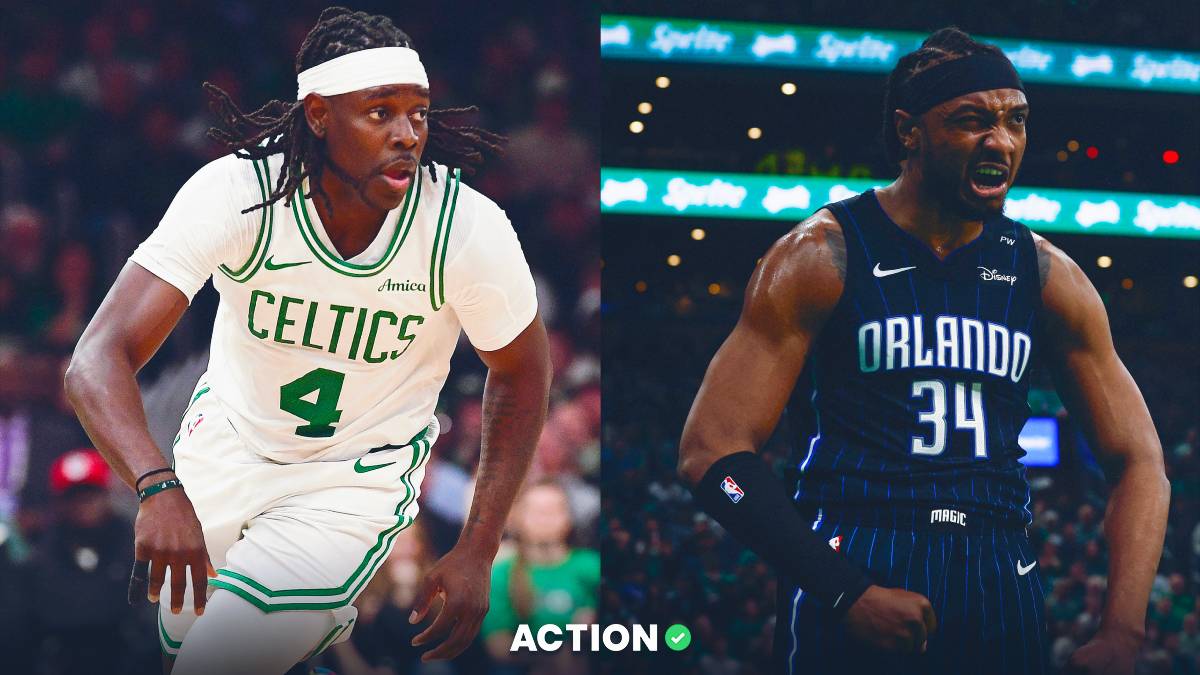You have likely heard about Russell Westbrook this season. For starters, this vomit-inducing chart:
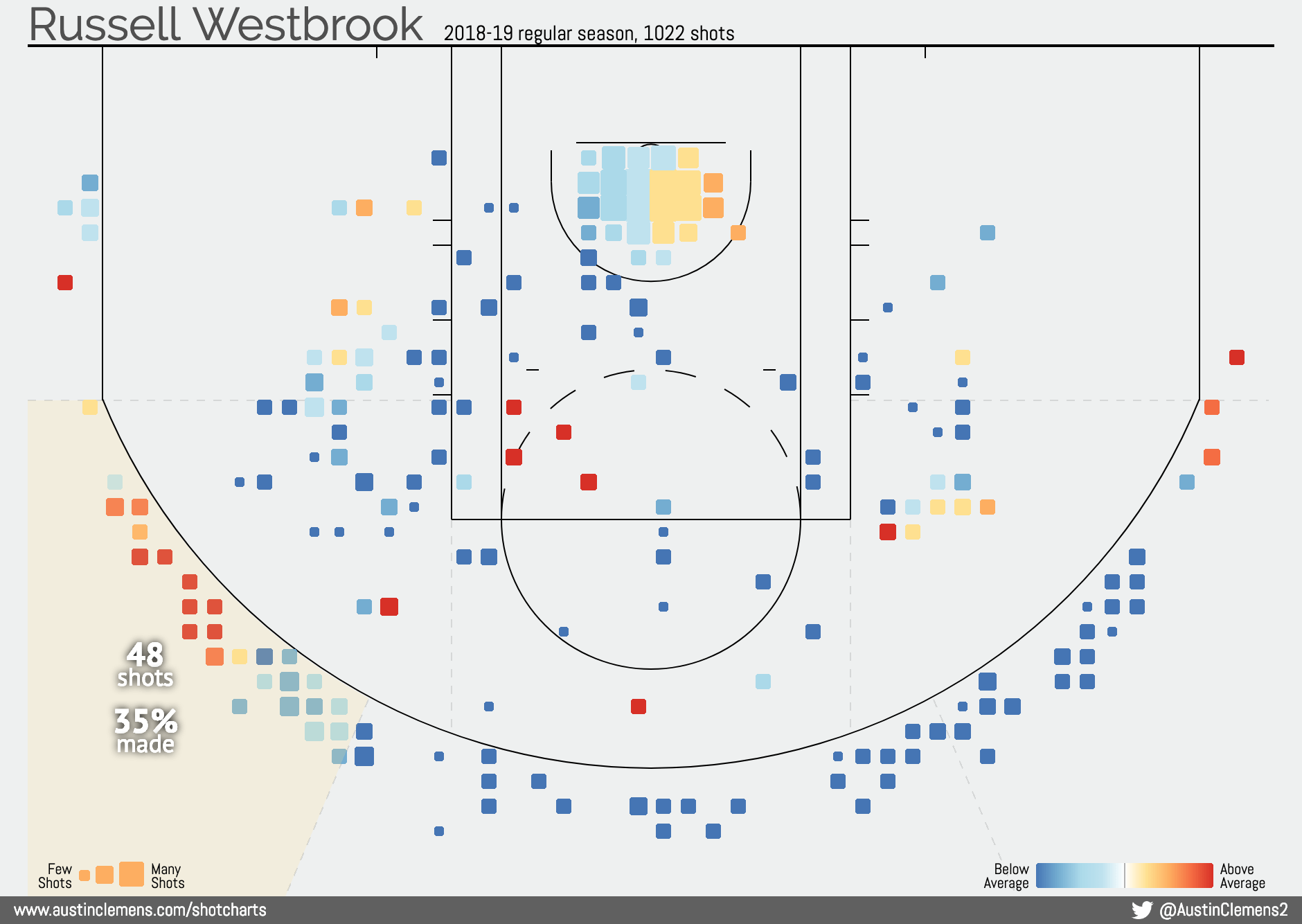
I'm not here to sugarcoat it.
Westbrook's shooting woes are historically bad.
Of all players to shoot at least 4.5 three-pointers per game over at least 50 games, Westbrook has the worst percentage in NBA history.
But wait! It's not just 3-point shots! Westbrook is averaging the worst percentage on mid-range attempts of any player to attempt three or more per game.
Hang on, I'm not done! Among all guards to shoot at least six free throws per game, Westbrook has the fifth-worst free-throw percentage in NBA history, and the worst since 1996.
It is not an exaggeration to say he is having the worst shooting season for a superstar in history.
So, it's easy to pile on Westbrook. He's a target of great scorn. In the past three years he has:
- Feuded with the Warriors
- Been blamed for Kevin Durant leaving to join the Warriors
- Won an MVP built largely on a statistical threshold he passed that, while historically significant, is also arbitrary
- Outwardly pursued the triple-double threshold often seemingly by pursuing the numbers as an end to themselves, regardless of the impact the rebounds in question provided his team's offense
- Has been largely the most unpleasant person to work with in regards to NBA media, and that's saying something
It's also a really simple argument to say Westbrook has been a negative this season.
Without Paul George — MVP candidate and the Thunder's best player this season — the Thunder offense with Westbrook on the floor drops by 15.7 points per 100 possessions, and the Thunder are outscored by 6.9 points in those minutes.
It is exceptionally easy to take that figure and extrapolate to this idea: Basically, George is the only thing keeping Westbrook afloat, and without him the Thunder are a lottery team. It's not wrong, based on that limited sample data.
It just misses the point of what Westbrook has done this year.
THE IMPACT
Let's start with considering what's important.
Is it important for Westbrook to be able to carry the team when George isn't on the court? 100 percent — and he's failed at that.
That's a major drag. Westbrook hasn't been the machine that carries the team this year in those scant minutes George sits.
However, that's not the most important thing.
What's most important is maximizing the minutes with George on the floor. The Oklahoma City offense with George on-court and Westbrook off goes from 104.1 to 94.9. The defense improves by a considerable margin (to be expected with bench units), but the OKC defense is good with and without Westbrook.
Additionally, if Westbrook's performance was such a drag, it wouldn't just be reflected in the team being better with him off-court — but the on-court performance would be mediocre-to-bad.
Consider that with James Harden on the floor this season, the Rockets outscore their opponents by three points per 100 possessions. With Westbrook on the floor, the Thunder outscore their opponents by 7.3 points per 100 possessions.
And when Harden's not on the court, the Rockets still outscore their opponents by 1.9, while the Thunder are outscored by 0.1 points per 100 possessions with Westbrook on the bench.
Does this mean that Westbrook has been better than Harden? Obviously not.
And if you swapped Westbrook and Harden this season, the Rockets are a flaming ravine of biohazardous waste while the Thunder might legitimately be better than the Warriors.
Regardless, the point is to say that not only is Westbrook not holding the Thunder back, but they are an absolute monster of a team with him on the floor.
Now if all Westbrook's numbers were like his shooting? Sure, the rest of the team would be dragging his corpse up and down the floor. But that's not happening.
THE OFFENSE
Let's start here: Westbrook isn't dominating the ball as much. His usage rate is not only down from his absurd numbers the past two years, but it's the lowest figure he's had since 2010. He's just not sucking up possessions at the same rate.
Via NBA.com, Westbrook is averaging 89 touches per game, compared to 95.7 last year and 94.8 the year prior. He still obviously has the ball the most of any Thunder player, but that's a significant reduction in usage rate.
The easy response is, "Well, he should have the ball less; he's been bad!"
Except that's not really the case, either. Consider this.
Westbrook averaged 0.11 assists per touch last season. This year, that's at 0.12. And overall he's averaging 13.9 assists per 100 possessions and 20.3 assist opportunities per game. Both of those figures lead the league. This is crucial to understanding what Westbrook is doing this season.
Westbrook is using fewer possessions and creating the most assists and assist opportunities in the league while doing it. He's also doing so on a team that isn't stacked with offensive talent.
George is All-World, no doubt. But Steven Adams needs to be set up; Jerami Grant and Terrance Ferguson are both wing players who need that creator.
Westbrook is managing an offense that started off bottom 10 in the league and since December 1 has been 11th.
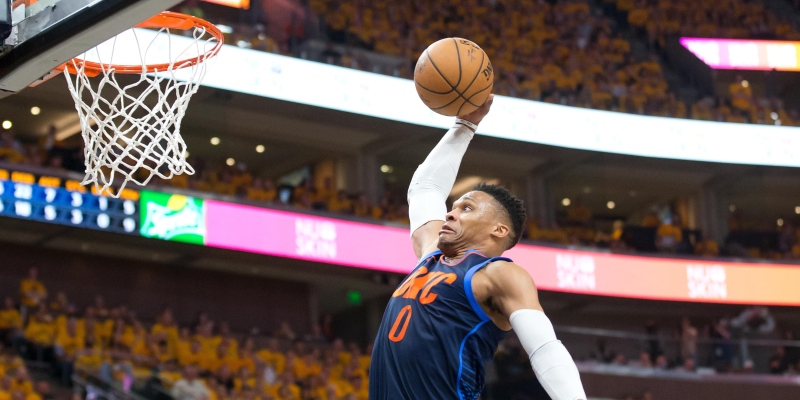
Let's also talk about the rim.
On non-post-ups, via Synergy Sports, Westbrook is averaging 1.25 points per possession at the rim. That's the best mark of his career.
Think about that. Westbrook is finishing at the rim better than ever and doing so in the 74th percentile of all players. That's hugely valuable for a player who is still so built on his athleticism.
If Westbrook were missing at the rim but having wildly inconsistent 3-point figures game-by-game, that would be considerably worse for the Thunder offense.
Do you want Westbrook bombing from deep, going 1-for-7 one game and 5-for-6 the next? Or do you want him finishing at a career-high clip around the rim?
Westbrook has the sixth-best shooting percentage inside five feet of any guard in the league, via NBA.com's stats. The idea has been that "Westbrook isn't the same guy" and that "his athleticism is starting to go and he's a shell of himself."
I'm here to tell you that just isn't true. He's finishing better on athletic plays than ever. He's setting up teammates just as much as ever.
And that's before we talk defense.
THE DEFENSE
Russell Westbrook isn't a great defender. He hasn't been since those early Thunder years, circa 2010-2012. That's a consequence of a lot of things, including injuries, offensive load management and effort.
His defense in 2017, the MVP season, was legitimately below-average. He gave very little effort and focus. In 2018, it was fine. Not great, but fine.
The Thunder's Defensive Rating this year is better with Westbrook on the bench. I'm not here to sell you that Westbrook is this great defender. His Defensive Rating of 105.9 is right in line with where it's been the past two seasons. He also ranks in the 54th percentile of individual defenders, per Synergy Sports.
But… Westbrook is averaging the sixth-most deflections per game of any player this season. Four of the five players ahead of him (Robert Covington, Kris Dunn, Kawhi Leonard, Paul George) are considered elite defenders. (No. 1 is James Harden, who has one of the worst Defensive Ratings in the league this season. It's a complicated stat.)
He's also just… playing harder.
His closeouts come with more force. Westbrook is contesting 4.9 shots this season compared to 3.5 last year. He's giving up more 3-pointers on shots defended, in part because he's actually defending more often. Here he really works to stay in front of the screen and hang with Lillard.
There are certainly still plays where the effort isn't there.
The Thunder hide Westbrook on non-shooters, and yet he's giving up a 39.6% shooting rate. He's ranked 22nd percentile on spot-up shots allowed. That doesn't vibe with the eye test, which in most cases show a harder closeout.
But more than anything, OKC still has what would be the fifth-ranked defense league-wide with Westbrook on the floor.
He's giving more, and the results show it.
THE TESTIMONIALS
Westbrook's teammates have his back, for what it's worth.
Paul George didn't understand why Westbrook has gotten the kind of criticism he's received this year. And he pointed out that the increased effort Westbrook's given this year has something to do with his shot as well.
"I don't understand it," George told The Action Network last month. "People don't understand that there's not many guys who play on both ends. It takes a lot of energy. Sometimes it's going to take your legs; sometimes it's going to take your shot away. Even when you're working out in the summertime and you start to get fatigued, regardless of whether there's a guy on you, you're going to start missing shots because you're tired."
"He's doing so many things to help us win. People don't talk about that anymore. He's still averaging a triple-double. He's leading the league in steals. He's playing both ends; he's doing everything for us. That's going to happen when you play that hard. There will be times when you can't shoot it because you're exhausted."
Coach Billy Donovan pointed to one key element that may best describe the way Westbrook has helped the Thunder the most this year: establishing pace.
"You have to account for him in transition coming into the paint," Donovan told The Action Network. "He's done a great job of helping us hold pace, get the ball across half-court, and when he's in a full sprint like that, the floor collapses. He's done a great job moving the ball and finding shots for a lot of different guys."
Westbrook does, in fact, get downhill lightning-fast.
The possession below is off a made shot. The focus and dedication to pushing the ball off makes takes a lot more out of you, but it also increases the likelihood of the defense not being set and allowing a breakdown like the one here:
"There's so much more to his game than just shooting and making shots," Donovan said. "There's the rebounding, he gives you steals, he attacks the paint, gets to the free throw line. He's not a one-dimensional player. "
Here Westbrook recovers on the drive to block the shot at the rim, lands and immediately heads the other way at lightning speed before delivering an incredibly difficult pass to Raymond Felton for an open 3-pointer.
It's these kinds of plays that are more valuable than any double-digit combination of stats he may produce.
"He's a guy who has led the league in scoring," Donovan notes, "could probably do it again if he wanted to. But he's looked at our team, and this is how we need to play, this is what we need to do. He can impact the game in a lot of different ways. I think his shooting will come around, but I also think that we need him to continue playing with that pace and getting the ball downhill. It's getting our offense ahead of the defense."
Westbrook had 199 transition assists last year, according to Synergy Sports. He has 165 this season with over 20 games left to play. The Thunder play at a pace two possessions higher with Westbrook on-court vs. off (a bigger margin than it sounds like).
The Thunder generate 21.6 fast-break points per 100 possessions with Westbrook on the court. With him on the bench, that number drops to just 10.6. That's for a team that is fourth league-wide in transition points per game.
The very thing Westbrook does best — take the ball and go — is crucial to the team's identity. That's partly a credit to Donovan and GM Sam Presti for building a fleet of spaceships around Westbrook, and a credit to Westbrook for not just clanging at the rim constantly but instead learning to trust teammates.
TRUST
This sequence has defined Westbrook's season in my mind. Late in a tight game on the road vs. the Sixers, Westbrook puts up a horrible, heavily-contested-by-Ben-Simmons-no-less 3-point attempt at a dagger.
But Steven Adams does the dirty work and gets the offensive rebound and kicks it out. Westbrook gets it on the wing with a lane. He can try and slide through for his drifting righty-layup or pull-up from mid-range.
Instead, he drives as hard as possible to draw the defense, turns and perfectly kicks a pass backwards to Terrance Ferguson.
Bang.
That's different. It's Westbrook in one sequence opting for the worst shot he can take (especially this season), his teammates saving his bacon and him rewarding them by making the right play.
Westbrook plays this season like he knows he doesn't need to do it all himself.
He's taken a backseat to George, and PG13 has become an MVP candidate. He's embraced a role as a guy who brings the whole thing together, and team success has followed.
His 2017 MVP campaign was in part basketball Hedonism, part experimentation. What could one player do if given complete and total freedom to try and push his role the furthest? He showed what an individual can accomplish.
This year, it hasn't all come together. The clutch shots aren't there. His jumper isn't peaking. Yet he's been a hugely impactful player for what many consider to be the second-best team in the West and a real threat to the Warriors.
There are little signs it may be turning as well.
Over the last five games, he's shooting 46% from the floor, 35% from deep and 77% from the line. He shot 15-of-29 from the field and 6-of-13 from 3 vs. the Jazz in a huge win Friday.
If Westbrook's jumper progresses to the mean, it could fundamentally shift the Thunder's offensive balance dramatically for a short time.
Even if it doesn't, though — even if this is just one of those years for his jumper the way a lot of players have, especially coming off preseason surgery like Westbrook is — it doesn't change what this season has shown.
He can be more than a triple-double machine. He does have a savvier approach and adaptability in him. And more than anything?
This season has shown what Russell Westbrook is willing to do to win, whether the jumper is wet or not.


